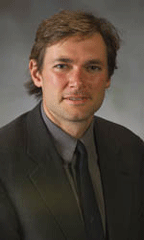Lead in the Water
Air Date: Week of February 20, 2009

Water contaminated with high concentrations of lead flowed in the nation’s capital for three years. (Photo: Joe Shlabotnik)
Professor Marc Edwards has been investigating the health effects of high concentrations of lead in Washington DC's water system. What he found out along the way was troubling. Tens of thousands of children were at risk while officials insisted residents were safe.
Transcript
GELLERMAN: It's Living on Earth, I'm Bruce Gellerman.
The word plumber comes from the Latin: plumbarius - lead worker - a slave who constructed waterways and roofs in ancient Rome using lead. Even back then, the dangers of lead were well known. Yet, recently two scientific studies concluded there were no adverse health effects from drinking Washington DC’s tap water, even though it contained the highest level of lead ever recorded in the U.S.
Professor Marc Edwards read those studies and became suspicious. He teaches civil and environmental engineering at Virginia Tech and says the problem started about eight years ago, when D.C.’s Water and Sewer Authority changed the way they disinfect the city’s water.
EDWARDS: Well it was triggered by a well intentioned switch from free chlorine disinfectant to a new chemical called chloramine. And unbeknownst to us at the time, that switch was causing lead rust that had accumulated on lead plumbing materials to fall off into the water at very, very high concentrations. And indeed, fifteen parts per billion’s considered high for drinking water. 5,000 parts per billion qualified water as a hazardous waste. So these were levels that were even higher than hazardous waste levels of lead.

Marc Edwards.
EDWARDS: Correct. And this report was startling because it contradicted decades of good scientific research that clearly showed that if you ingest water that has high lead in it, you will suffer harm.
GELLERMAN: Is that when you got interested in this subject?
EDWARDS: I got interested when the CDC study was being quoted not only in Washington DC, but all over the country and indeed all over the world, as evidence that high lead in water would not harm anybody. And so we went to the CDC asked them for details about their study, and they refused to give us any. So we then started digging a little bit more and we discovered some horrific flaws. CDC tested blood lead of people in early 2004, and they claimed that these residents were the worst case, the residents that had the highest lead in their water. What they failed to tell people was that none of these people had been drinking the water for a year to many months before their blood lead was taken to look for lead. They’d received a letter from the water utility informing them of their high lead in their water and steps they could take to remove the lead from the water by flushing or by using filters. So the whole premise of the study was flawed because none of the people that they’d been testing were, in fact, drinking the water as it was represented to the public.
GELLERMAN: Now the water authority in Washington D.C. commissions a study that’s done by the George Washington University Chair of Public Health at the time. And he comes out with a report that’s published in a very prestigious journal, Environmental Health Perspectives and he concludes basically the same thing that the CDC had concluded three years earlier.
EDWARDS: Yes, it was very perplexing. Not only had CDC published this study that contradicted all our years of experience and prior scientific research but this independent group apparently did as well. So we started doing Freedom of Information Act requests for the emails related to how this study was prepared and emails between the authors and the editors of Environmental Health Perspectives and what we found was very, very shocking. The key conclusion of the study that there was no identifiable harm done from the years of lead in D.C. water was published by mistake. It was agreed to remove that conclusion from the study before publication, but somehow contrary to the wishes of the editors, it got put back in.
GELLERMAN: That study was funded by the Water and Sewer Authority of Washington, D.C.
EDWARDS: Yes, obviously, a slight conflict of interest there.
GELLERMAN: The funding was reported to the Environmental Health Perspective Journal, but what wasn’t disclosed was the fact that this researcher had agreed to show the Water and Sewer Authority his papers and research before it got published.
EDWARDS: That’s correct. The Freedom of Information Act requests showed that the water utility reviewed this paper at multiple points of its path up to publication. It also showed that the water utility helped in the creation of the data behind the scenes. And what’s more, the financial relationship between the water utility and Dr. Guidotti was not actually disclosed until I did a Freedom of Information Act request starting to look at the financial entanglements between the two institutions.
GELLERMAN: And Dr. Tee Guidotti is the researcher from George Washington University who was paid to do this study by the Water and Sewer Authority of D.C.
EDWARDS: Yes.
GELLERMAN: So Professor, you looked at the level of lead in water in kids’ blood. What did you find?

Water contaminated with high concentrations of lead flowed in the nation’s capital for three years. (Photo: Joe Shlabotnik)
GELLERMAN: Well what happens now?
EDWARDS: Well, I’m not sure. This is going to be a mess. In my opinion, this is one of the most significant environmental crimes in U.S. history, if you consider the number of children impacted, the known effects of this neurotoxin, lead, the astronomical amounts of lead in D.C. water, and it’s all made the more insidious by the fact that the perpetrators of this were the very people who are paid to protect us.
GELLERMAN: Mark Edwards is a professor of civil and environmental engineering at Virginia Tech. Professor Edwards, thanks a lot.
EDWARDS: You’re welcome.
Links
Living on Earth wants to hear from you!
Living on Earth
62 Calef Highway, Suite 212
Lee, NH 03861
Telephone: 617-287-4121
E-mail: comments@loe.org
Newsletter [Click here]
Donate to Living on Earth!
Living on Earth is an independent media program and relies entirely on contributions from listeners and institutions supporting public service. Please donate now to preserve an independent environmental voice.
NewsletterLiving on Earth offers a weekly delivery of the show's rundown to your mailbox. Sign up for our newsletter today!
 Sailors For The Sea: Be the change you want to sea.
Sailors For The Sea: Be the change you want to sea.
 The Grantham Foundation for the Protection of the Environment: Committed to protecting and improving the health of the global environment.
The Grantham Foundation for the Protection of the Environment: Committed to protecting and improving the health of the global environment.
 Contribute to Living on Earth and receive, as our gift to you, an archival print of one of Mark Seth Lender's extraordinary wildlife photographs. Follow the link to see Mark's current collection of photographs.
Contribute to Living on Earth and receive, as our gift to you, an archival print of one of Mark Seth Lender's extraordinary wildlife photographs. Follow the link to see Mark's current collection of photographs.
 Buy a signed copy of Mark Seth Lender's book Smeagull the Seagull & support Living on Earth
Buy a signed copy of Mark Seth Lender's book Smeagull the Seagull & support Living on Earth

